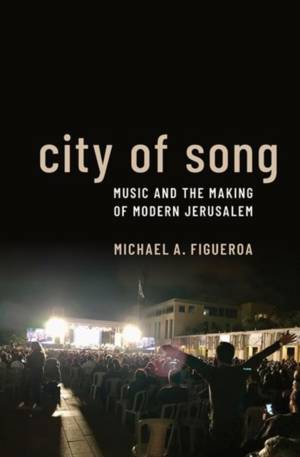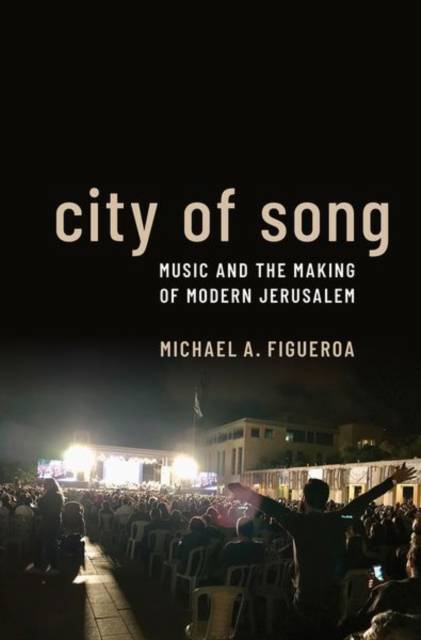
Door een staking bij bpost kan je online bestelling op dit moment iets langer onderweg zijn dan voorzien. Dringend iets nodig? Onze winkels ontvangen jou met open armen!
- Afhalen na 1 uur in een winkel met voorraad
- Gratis thuislevering in België vanaf € 30
- Ruim aanbod met 7 miljoen producten
Door een staking bij bpost kan je online bestelling op dit moment iets langer onderweg zijn dan voorzien. Dringend iets nodig? Onze winkels ontvangen jou met open armen!
- Afhalen na 1 uur in een winkel met voorraad
- Gratis thuislevering in België vanaf € 30
- Ruim aanbod met 7 miljoen producten
Zoeken
€ 113,45
+ 226 punten
Uitvoering
Omschrijving
Modern Jerusalem, a city central to Jewish, Muslim, and Christian religious imaginaries and the political epicenter of the Israeli-Palestinian crisis, is to put it mildly a highly contested space. More surprising, perhaps, is that its musical landscape not only reflects these rifts but also
helped to define them as the ancient city transitioned to modernity during the twentieth century. In City of Song: Music and the Making of Modern Jerusalem, author Michael A. Figueroa argues that musical renderings of Jerusalem have been critical to the formation of Israeli political consciousness.
The book demonstrates how Israeli songwriters helped to shape their public's territorial imagination-- creating images of a city at once heavenly and earthly, that dwells in longing, that must not be forgotten, that compels one to bereave the dead, that represents the fulfilment of prophecy, and
that is the site of immense cultural diversity. The dynamic history of its representation in lyrics and music helps dispel any notion that the Israeli-Palestinian crisis is timeless, intractable, and based on static, essential identities; while there are continuities across historical divides,
radical change constantly transpires. City of Song combines analyses of musical meaning, political discourse, and public performance over the long twentieth century (1880s-2010) to reveal how the Israeli-Palestinian crisis' territorial fixation on Jerusalem has been constructed, historically contingent, and subject to artistic
intervention in modernity. Through a musical history of Jerusalem, Figueroa introduces a novel, humanities-centered approach to one of the world's most contested cities, and one of the defining cultural and political questions of our era.
helped to define them as the ancient city transitioned to modernity during the twentieth century. In City of Song: Music and the Making of Modern Jerusalem, author Michael A. Figueroa argues that musical renderings of Jerusalem have been critical to the formation of Israeli political consciousness.
The book demonstrates how Israeli songwriters helped to shape their public's territorial imagination-- creating images of a city at once heavenly and earthly, that dwells in longing, that must not be forgotten, that compels one to bereave the dead, that represents the fulfilment of prophecy, and
that is the site of immense cultural diversity. The dynamic history of its representation in lyrics and music helps dispel any notion that the Israeli-Palestinian crisis is timeless, intractable, and based on static, essential identities; while there are continuities across historical divides,
radical change constantly transpires. City of Song combines analyses of musical meaning, political discourse, and public performance over the long twentieth century (1880s-2010) to reveal how the Israeli-Palestinian crisis' territorial fixation on Jerusalem has been constructed, historically contingent, and subject to artistic
intervention in modernity. Through a musical history of Jerusalem, Figueroa introduces a novel, humanities-centered approach to one of the world's most contested cities, and one of the defining cultural and political questions of our era.
Specificaties
Betrokkenen
- Auteur(s):
- Uitgeverij:
Inhoud
- Aantal bladzijden:
- 262
- Taal:
- Engels
Eigenschappen
- Productcode (EAN):
- 9780197546475
- Verschijningsdatum:
- 31/01/2022
- Uitvoering:
- Hardcover
- Formaat:
- Genaaid
- Afmetingen:
- 159 mm x 241 mm
- Gewicht:
- 503 g

Alleen bij Standaard Boekhandel
+ 226 punten op je klantenkaart van Standaard Boekhandel
Beoordelingen
We publiceren alleen reviews die voldoen aan de voorwaarden voor reviews. Bekijk onze voorwaarden voor reviews.











